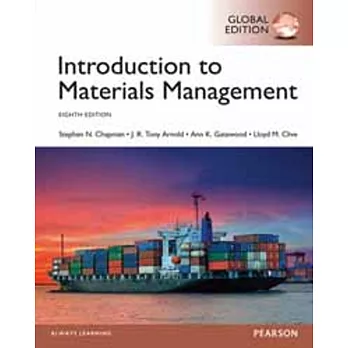For all courses in Materials Management, Production, Inventory Control, and Logistics taught in business and industrial technology departments of community colleges, four-year colleges, and universities.
Understand all elements of production planning and control, and how they fit together with Introduction to Materials Management.
Clearly written and exceptionally user-friendly, this text covers all the essentials of modern supply chain management, manufacturing planning and control systems, purchasing, and physical distribution. Content, examples, questions, and problems lead students step-by-step to mastery. Widely adopted by colleges and universities worldwide, this is the only APICS-listed reference text for the Basics of Supply Chain Management (BSCM) CPIM certification examination.
本書特色
● Resonates with a wide audience of students in materials management and supply chain courses. Simple, clear, and readable,this accessible text avoids unnecessarily complex mathematics.
● Helps students understand all elements of production planning and control, and how they fit together. Comprehensive explanations of the essentials of production planning and control include production planning systems, master scheduling, MRP, capacity management, and production activity control.
● UPDATED: Covers all the issues students will need to be familiar with to succeed with modern materials management. Wide-ranging, up-to-date topic coverage includes ISO standards, KPI, Theory of Constraints, Project Management, Collaborative Planning, Forecasting, and Replenishment (CPFR), continuous work in process (CONWIP), 4th party logistics (4PL), sustainability and much more. Chapter-by-chapter updates include:
。 Chapter 1
.Added definition of configure-to-order.
。 Chapter 2
.Added discussion of difference between strategic plan and strategic business plan, sustainability and social responsibility, reverse supply chain and reverse logistics, and risk management.
.Added definitions of Key Performance Indicators and balanced scorecard and Advanced Planning and Scheduling (APS) systems.
。 Chapter 3
.Added definition and discussion of postponement.
。 Chapter 5
.Added description of productivity and safety capacity.
。 Chapter 6, added:
.A brief introduction to project management.
.Discussion of scheduling in a non-manufacturing setting.
.An expanded discussion of the Drum-Buffer-Rope system for Theory of Constraints and of measurements.
。 Chapter 8, added:
.A significant expansion of the concepts in demand management.
.A brief discussion of Collaborative Planning, Forecasting, and Replenishment (CPFR).
。 Chapter 9, added:
.Expanded discussion of Maintenance, Repair, and Operational inventory (MRO).
.Defined inventory velocity and inventory profiling.
。 Chapter 12, added:
.Increased discussion of cycle counting.
.Discussion of consignment inventory and vendor managed inventory (VMI).
。 Chapter 13, added:
.Discussion of 4th party logistics (4PL).
.Definition of intermodal transportation.
.Expanded discussion of transportation scheduling.
.Update to the discussion of INCOTERMS.
。 Chapter 14, added:
.Discussion of environmental sensitivity and supply chain collaboration.
.Comparison of job costing versus process costing.
。 Chapter 15, added:
.Definition and discussion of single moment exchange of die (SMED) and of standardized work.
.Definition of Heijunka.
.Discussion of Little’s Law, visual management, and lean accounting.
.Definition and discussion of continuous work in process (CONWIP).
。 Chapter 16, added
.Increased discussion of measurements and Key Performance Indicators (KPI).
.Update of ISO standards.
● Prepares students for success in organizations that use APICS methods and APICS certification. This title is the only primary reference for key APICS Certification courses including Basics of Supply Chain Management and Detailed Scheduling and Planning. It helps students prepare for APICS certification by mastering APICS concepts, techniques, and vocabulary.
● Prepares students for any role in inventory management. Three full chapters on inventory management introduce core techniques ranging from setting order quantities to utilizing independent demand ordering systems.
● UPDATED: Helps students test, apply, and deepen their knowledge.Extensive pedagogical features include chapter introductions and summaries, Key Terms, margin icons, questions, and problems (solutions provided for approximately 50% of problems). Many end-of-chapter problems have been revised, and some new ones added.
● UPDATED: Allows students to apply concepts in the context of real businesses. Nine new end-of-chapter case studies allow students to explore and apply chapter concepts in more detail and in the context of real business situations.
。 Case Study 1.1: Fran’s Flowers
。 Case Study 2.2: Williams 3D Printers
。 Case Study 3.2: The MasterChip Electronics Company
。 Case Study 3.3: Macarry’s Bicycle Company
。 Case Study 4.2: Benzie Products Company
。 Case Study 6.2: Crofts Printing Company
。 Case Study 6.3: Melrose Products
。 Case Study 7.2: The Connery Company
。 Case Study 8.2: Hatcher Gear Company
● NEW: Discusses concepts in non-manufacturing settings. Since students will often have more experience with non-manufacturing businesses, new features help readers understand the concept in a familiar setting:
。 New text boxes help students relate manufacturing concepts to different types of business environments. (Chapters 4, 5,7,12,14)
。 A brief introduction of scheduling in non-manufacturing settings helps readers relate to the material.
● UPDATED: Helps students understand the importance of the field at a higher level. The discussion on the purpose and impact ofstrategic planning—including environmental and sustainability issues—is greatly expanded to include impacts and benefits to society as a whole. (Chapter 2)
● NEW: Provides a brief introduction to project management. A brief overview gives students an introduction to project management concepts, showing how they relate to materials management and are implemented in companies. (Chapter 6 and throughout)
● UPDATED: Expansion of Theory of Constraint (TOC) coverage. TOC provides an interesting alternative method to think about the concepts in the book and can help overall learning as students compare and contrast TOC with non-TOC approaches. (Chapter 6)
● UPDATED: Significant expansion of demand management. The expansion of forecasting as only a part of overall demand management provides students with a higher level understanding of where demand comes from and how to understand and manage it more effectively. (Chapter 8)
● Supports teaching and learning. The full supplements package includes an Instructor's Manual, Computerized Test Bank, PowerPoint, and Image Bank for download.



 天天爆殺
天天爆殺  今日66折
今日66折 

























 博客來
博客來 博客來
博客來 博客來
博客來 博客來
博客來 博客來
博客來